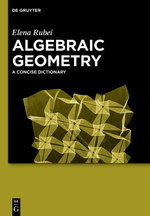Books
- E. Rubei "Algebraic Geometry - A concise dictionary", Berlin,
De Gruyter , 2014,
http://www.degruyter.com/view/product/207032

- E. Rubei "Geometria e Algebra Lineare" Pearson , 2016 (Errata Corrige)
Other works
- E. Rubei, "Abelian varieties: their projective geometry
applications to riemannian manifolds"
tesi di perfezionamento, Scuola Normale Superiore
di Pisa, defended in February 1998.
- A. Colesanti, E.Rubei "Appunti per il corso di Laboratorio di Matematica" per il 1 anno del corso di laurea in Matematica a.a. 1999-2000
- A. Colesanti, S. Dolfi, E.Rubei "Dispense di Laboratorio di Matematica"
per il 1 anno del corso di laurea in Matematica
File pdf
Programs about interval matrices
Main programs (the input mu must be given as the two matrices m and M, containing respectively the minima and the maxima of the entries of mu):
Auxiliary programs:
Nota. Il numero medio degli autori delle mie pubblicazioni è 1,3, quello medio calcolato da me su un numero piuttosto ampio di professori associati di geometria è 2,3.
Gli indici bibliometrici ultimamente in Italia vengono vergognosamente calcolati ignorando il numero degli autori.
Quindi per avere indici bibliometrici miei "giusti" moltiplicate quelli calcolati ignorando il numero degli autori per 2,3/1,3 (anche se temo che la dipendenza della funzione citazioni dalla variabile numero autori sia lineare ma sovralineare... )